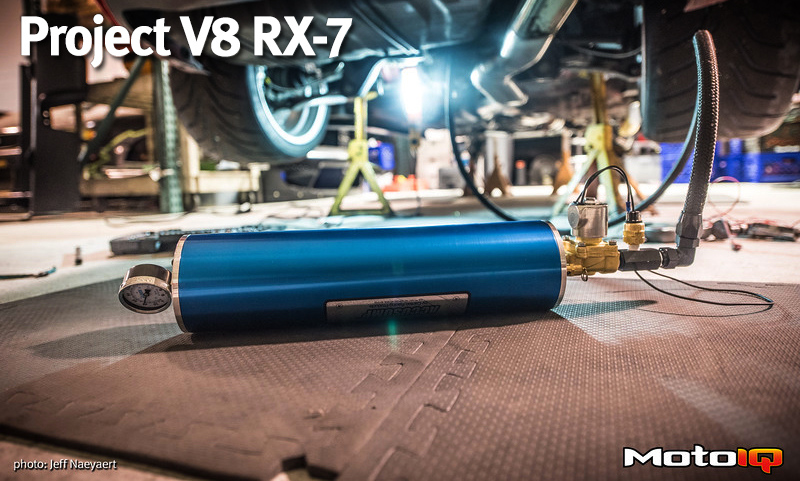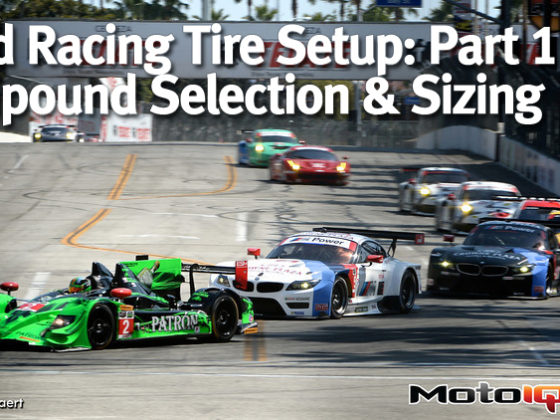
Project V8 RX-7: More Oiling Insurance From Improved Racing, Accusump and Earl’s (Part 1 of 2)
It’s no secret the LS family of engines can have oil starvation issues particularly on the racetrack. In high-g turns oil is forced to once side of the pan leaving the oil pickup dry and thus starving the oil pump and the engine’s components of oil. Catastrophic damage can result in as little as a few seconds depending on engine speed. Corvette and Camaro owners who track their cars regularly modify their oil pans with baffles, overfill their engine oil, add dry sump systems and oil accumulators. Chevrolet attempted to address the problem by equipping certain LS3 and LS7’s in their C6 Corvettes with a “sorta” dry sump system from the factory.
We’ve already installed an oil pan baffle from Improved Racing in Project V8 RX-7 but if big ole Camaros weighing as much 20% or more than our FD are pulling enough G’s to starve the oil pump it seems logical to conclude that risk would only be greater in our lightweight RX-7 with big sticky tires and wider track. A true dry sump system would be the ultimate in oiling insurance and quite fitting for our “nothing but the best” flagship project. Unfortunately, dry sump systems need big external oil tanks and we’re already out of real estate under the hood of our little Mazrolet. They also cost a lot of money and if we had to pay for one.. well we probably wouldn’t get one until we blew up a motor to prove we really needed it. Enter the next best thing—an oil accumulator.
Put simply, an oil accumulator is a pressurized tank of reserve oil. There’s a piston inside with pressurized air on the back side of the piston, oil on the top side and either a manual or electric valve that is then plumbed directly to the pressure side of the engine’s oiling system. When the engine is running, the engine oil pressure from the oil pump fills the accumulator and stores the oil. If engine oil pressure drops below a certain threshold while the engine is running the electric valve is opened and pressurized oil is immediately supplied to the oiling system. This oil is supplied until either the pressure rises above the threshold or all the oil in the accumulator is expelled—anywhere from 15-60 seconds depending on engine speed and the size of the engine.

side leaving the sump dry–simulating a low-pressure scenario.
The valve of the accumulator opens and fresh oil is supplied to the engine.

When the engine is shut off, the valve closes and engine oil pressure at the time of shut-off is maintained. Another neat feature of the accumulator is its engine start-up protection. Opening the valve prior to starting the engine pre-oils engine components at whatever oil pressure the engine was at when last shut off and the accumulator valve closed.
We got our hands on the original and arguably the most well known and best selling oil accumulator, the Accusump, manufactured by Canton Racing Products.
 Available in 1, 2 and 3-quart capacities we chose a 3-quart unit. Bigger is better—the larger the accumulator’s capacity the more pre-oiling and longer engine protection it can provide as long as you have the space to mount it.
Available in 1, 2 and 3-quart capacities we chose a 3-quart unit. Bigger is better—the larger the accumulator’s capacity the more pre-oiling and longer engine protection it can provide as long as you have the space to mount it.
 Our 3-quart Accusump unit measures 4.25 inches in diameter by 16 inches in length before adding the gauge on one end and valve and plumbing on the other. There is no room for it to be mounted anywhere under the hood and we don’t want to mount the accumulator inside the car because if a fitting or line fails that means hot oil spraying around. It’s a little far from the engine, but there is a gap between the rear subframe and the fuel tank on the FD RX-7 that looks like it may be just the place to stick our Accusump.
Our 3-quart Accusump unit measures 4.25 inches in diameter by 16 inches in length before adding the gauge on one end and valve and plumbing on the other. There is no room for it to be mounted anywhere under the hood and we don’t want to mount the accumulator inside the car because if a fitting or line fails that means hot oil spraying around. It’s a little far from the engine, but there is a gap between the rear subframe and the fuel tank on the FD RX-7 that looks like it may be just the place to stick our Accusump.


